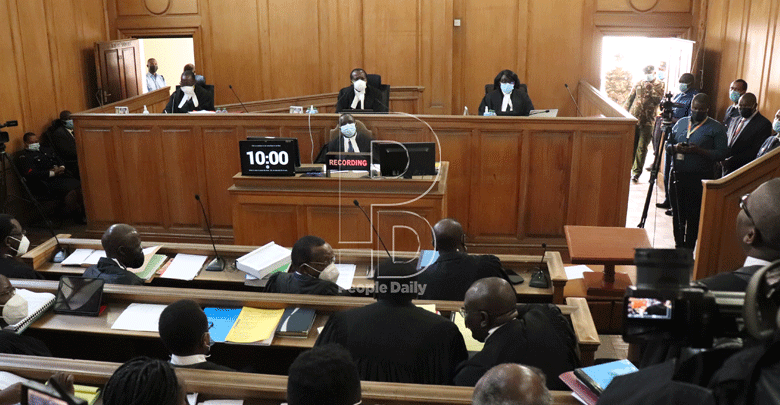Stage set for titanic legal battle over ruling on BBI
By Bernice Mbugua, June 3, 2021Bernice Mbugua @BerniceMuhindi
The stage is set for a titanic legal battle over the Building Bridges Initiative (BBI) after the Court of Appeal declared that the matter be heard on priority basis by a seven-judge Bench.
Lawyers representing President Uhuru Kenyatta, Opposition chief Raila Odinga, the Attorney-General and the national electoral agency yesterday indicated they intend to make strong arguments against the May 13 High Court ruling declaring the BBI, “unconstitutional, null and void”.
In what could be reminiscent of the 2017 presidential election petition, the parties have assembled powerful teams of the country’s top legal minds, signalling a possible battle of wits when the matter comes up for hearing.
“The Appeal shall be heard on 29th June to 2 July. The hearing shall be in an open court to be arranged in compliance with Covid-19 protocols,” directed Court of Appeal President Daniel Musinga, alongside Justices Roseline Nambuye and Hannah Okwengu, during a pre-trial conference in Nairobi yesterday.
Besides declaring BBI illegal, the High Court also ruled that the Independent Electoral and Boundaries Commission (IEBC) was improperly constituted and that Uhuru can be sued while in office.
They barred the commission from conducting a referendum on the initiative.
The judges also returned a verdict that the President had violated the Constitution by spear-heading constitutional amendment through a popular initiative.
Yesterday, the Appeal Court judges allowed IEBC to continue discharging its functions such as conducting by-elections but not touch any issues relating to BBI.
Justice Musinga directed all intended appellants who have given notices of appeal to file a supplementary memorandum of appeal within seven days.
“All appellants shall file and serve their respective submissions within seven days.
The respondents shall file and serve their respective submissions and bundle of authority within 14 days of service,” he directed.
The judges directed the parties to limit their submissions to 40 pages and all parties shall have two hours each to make their case.
“The court shall, however, be at liberty to limit the time to avoid repetition. The appellant shall be at liberty to make a reply to the respondent submission limited to 30 minutes,” he said.
President criticism
The court cautioned all the parties against prosecuting or defending their respective positions in the media.
“Please allow the court to make a fair, properly informed decision without unnecessary attacks commenced by all concerned. Let us realise we have an important judicial process that must be handled in a very sober manner,” he pleaded.
Justice Musinga was responding to concerns by lawyer Dudley Ochiel who represents Katiba Institute over the President’s criticism of the Judiciary in his Madaraka Day address on Tuesday, arguing that it amounted to contempt of court.
“I seek your directions on remarks made by a party to these proceedings using a high office of a State Officer in a manner that will bring what we are about to do before you into disrepute,” he said.
Ochiel said that the President, who is a party to the case, and his comments undermined public confidence in the Judiciary.
Justice Musinga did not rule on the matter but cautioned parties to conduct the proceedings with dignity.
The President is being represented by senior counsel Waweru Gatonye, Mohammed Nyaoga and Desterio Oyatsi.
Attorney General Kihara Kariuki is represented by Senior Counsel George Oraro, Solicitor-General Ken Ogeto, lawyers Paul Nyamodi and Kamau Karori.
The Attorney General has expressed dissatisfaction with the entire decision of the five-judge Bench which declared the BBI process illegal.
Former Attorney General Githu Muigai and lawyer Eric Gumbo represent the electoral commission while Law Society of Kenya President Nelson will be conducting economist David Ndii’s defence.
Veteran lawyer John Khaminwa represents the Kenya Human Rights Commission (KHRC) which was an interested party in the High Court case.
Yesterday, Justice Nambuye told the parties that the court would be giving priority to the BBI appeal because it had “a weightier public appeal.”
“It is not that we are favouring these proceedings, it is because of the circumstances. It is something we have done before; each case depends on its own circumstances,” she said.
The Appellate judge asked the lawyers to direct their focus to the core issues since they already have pleadings from the High Court. “Direct major focus on the core issues for us to understand what you are not happy with in the judgement,” she told the lawyers.
Critical decision
In their petition, Uhuru and Raila argue that the High Court judges usurped the sovereign power of the people of Kenya and declared themselves the critical decision-makers of what can or cannot be amended in the Constitution.
According to the two Handshake partners, the judges stopped a non-existent initiative because the BBI Taskforce ceased to exist in June 2020, and was, therefore, incapable of promoting a drive to amend the Constitution.
Uhuru also challenges the High Court declaration that he can be sued in his personal capacity and not as the President of the Republic of Kenya.
President Kenyatta is further aggrieved with the declaration that he contravened Chapter 6 of the Constitution, and specifically Article 73(1) (a) (i) of the Constitution, by initiating and promoting a constitutional change process under Article 257 contrary to the provisions of the Constitution.
He is also fighting the judges’ declaration that civil court proceedings can be instituted against the President or a person performing the functions of the Office of the President during their tenure of office in respect of anything done or not done contrary to the Constitution.
Prof Muigai has indicated they will contest the finding that IEBC lacks requisite quorum for purposes of carrying out its constitutional and statutory mandate as well as a referendum.
Among other issues they intend to appeal on are the findings that it ought to have carried out a separate nationwide voter registration for the specific purpose of the intended referendum.
